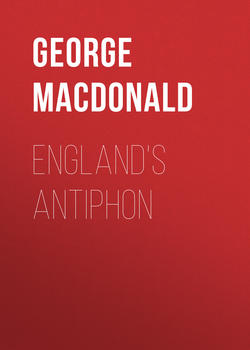England's Antiphon

Реклама. ООО «ЛитРес», ИНН: 7719571260.
Оглавление
George MacDonald. England's Antiphon
PREFACE
ENGLAND'S ANTIPHON. INTRODUCTION
CHAPTER I
CHAPTER II
GOOD COUNSEL OF CHAUCER
CHAPTER III
THANK GOD FOR ALL
CHAPTER IV
GASCOIGNE'S GOOD MORROW
THAT EACH THING IS HURT OF ITSELF
CHAPTER V
AN HYMN OF HEAVENLY LOVE
A LONG FAREWELL TO GLITTERING TRIFLES
PSALM XCVI
PSALM XLIV
PSALM LXV
PSALM XCIII
PSALM CXXXIX
CHAPTER VI
NEW PRINCE, NEW POMP
CONTENT AND RICH
THE CHARACTER OF A HAPPY LIFE
CHAPTER VII
A HYMN TO GOD THE FATHER
A HYMN TO CHRIST
RESURRECTION
CHAPTER VIII
ANTHEM FOR THE CATHEDRAL OF EXETER
FOR CHRISTMAS-DAY
PSALM XCII
PSALM CXXIII
CHAPTER IX
THE SINNER'S SACRIFICE
1.—TO THE HOLY TRINITY
2.—AN HYMN TO GOD THE FATHER
3.—AN HYMN ON THE NATIVITY OF MY SAVIOUR
UPON AN HONEST MAN'S FORTUNE
A SONG OF LABOUR
CHAPTER X
OF THE EPIPHANY
IN DESOLATION
CHANGE SHOULD BREED CHANGE
CHAPTER XI
PSALM CXXX
CHAPTER XII
WHEN WE CANNOT SLEEP
A ROCKING HYMN
A GRACE FOR A CHILD
HIS LITANY TO THE HOLY SPIRIT
THE WHITE ISLAND, OR PLACE OF THE BLEST
TO DEATH
ETERNITY
THE GOODNESS OF HIS GOD
TO GOD
DIVINE EPIGRAMS
PHOSPHOR, BRING THE DAY
CHAPTER XIII
THE ELIXIR
THE QUIP
THE COLLAR
AARON
THE PULLEY
THE THANKSGIVING
THE REPRISAL
CHAPTER XIV
ON TIME
AT A SOLEMN MUSIC
ON THE MORNING OF CHRIST'S NATIVITY
THE HYMN
CHAPTER XV
ON THE FOREGOING DIVINE POEMS
THE SECOND HYMN FOR ADVENT; OR, CHRIST'S COMING TO JERUSALEM IN TRIUMPH
HYMN FOR CHRISTMAS-DAY; BEING A DIALOGUE BETWEEN THREE SHEPHERDS
A HYMN FOR CHRISTMAS-DAY
THE PRAYER
A PRAYER FOR CHARITY
CHAPTER XVI
RESOLUTION
DEVOTION
THE PHILOSOPHER'S DEVOTION
CHARITY AND HUMILITY
THE RESOLUTION
THE RETURN
CHAPTER XVII
EASTER DAY
A HYMN OF THE NATIVITY SUNG BY THE SHEPHERDS
AND THEY LAID HIM IN A MANGER
ON A DROP OF DEW
THE CORONET
CHAPTER XVIII
COCK-CROWING
THE RETREAT
CHILDHOOD
THE NIGHT
THE DAWNING
CHRIST'S NATIVITY
EASTER HYMN
FIRST SUNDAY AFTER CHRISTMAS
THE ASPIRATION
THE RETURN
A GENERAL SONG OF PRAISE TO ALMIGHTY GOD
FOR COMMUNION WITH GOD
CHAPTER XIX
HAPPY FRAILTY
HYMN FOR EVENING
THE UNIVERSAL PRAYER
WEDNESDAY
A PENITENTIAL SOLILOQUY
THE SOUL'S TENDENCY TOWARDS ITS TRUE CENTRE
THE ANSWER TO THE DESPONDING SOUL
DIVINE EPIGRAMS
CHAPTER XX
HYMN
WRESTLING JACOB
CHAPTER XXI
DAYBREAK
ON ANOTHER'S SORROW
NINTH EVENING VOLUNTARY
HYMN
ON AN INFANT
"SHE LOVED MUCH."
CHAPTER XXII
EIGHTEENTH SUNDAY AFTER TRINITY
ST. MATTHEW
THE ETERNITY OF GOD
DESOLATION
REALITY
SONNET
BEREAVEMENT
COMFORT
A FAREWELL
CHAPTER XXIII
THE GOOD SHEPHERD WITH THE KID
LIV
XXXII
Отрывок из книги
If the act of worship be the highest human condition, it follows that the highest human art must find material in the modes of worship. The first poetry of a nation will not be religious poetry: the nation must have a history at least before it can possess any material capable of being cast into the mould of religious utterance; but, the nation once possessed of this material, poetry is the first form religious utterance will assume.
The earliest form of literature is the ballad, which is the germ of all subsequent forms of poetry, for it has in itself all their elements: the lyric, for it was first chanted to some stringed instrument; the epic, for it tells a tale, often of solemn and ancient report; the dramatic, for its actors are ever ready to start forward into life, snatch the word from the mouth of the narrator, and speak in their own persons. All these forms have been used for the utterance of religious thought and feeling. Of the lyrical poems of England, religion possesses the most; of the epic, the best; of the dramatic, the oldest.
.....
I will now give a modern version of it, in which I have spoiled the original of course, but I hope as little as well may be.
There were no doubt many religious poems in a certain amount of circulation of a different cast from these; some a metrical recounting of portions of the Bible history—a kind unsuited to our ends; others a setting forth of the doctrines and duties then believed and taught. Of the former class is one of the oldest Anglo-Saxon poems we have, that of Caedmon, and there are many specimens to be found in the fourteenth and fifteenth centuries. They could, however, have been of little service to the people, so few of whom could read, or could have procured manuscripts if they had been able to use them. A long and elaborate composition of the latter class was written in the reign of Edward II. by William de Shoreham, vicar of Chart-Sutton in Kent. He probably taught his own verses to the people at his catechisings. The intention was, no doubt, by the aid of measure and rhyme to facilitate the remembrance of the facts and doctrines. It consists of a long poem on the Seven Sacraments; of a shorter, associating the Canonical Hours with the principal events of the close of our Lord's life; of an exposition of the Ten Commandments, followed by a kind of treatise on the Seven Cardinal Sins: the fifth part describes the different joys of the Virgin; the sixth, in praise of the Virgin, is perhaps the most poetic; the last is less easy to characterize. The poem is written in the Kentish dialect, and is difficult.
.....